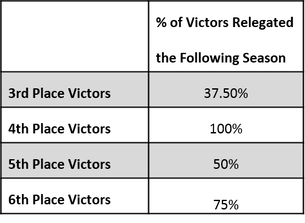
Competition design is an essential element of sport. The structure of these competition dictate the outcomes that are achieved. Organisers of events should be interested in designing competitions that are fairest to all those competing.
One positive attribute of the league system is that it’s a very fair type of competition to judge which teams are the strongest. It’s a test of a team’s ability and endurance over a long period of time where every team plays each other twice (home and away). With this in mind you can say that the team which finishes 1st is probably the overall strongest in the league, the team in 2nd is probably the next strongest in the league, and so on. So it makes sense that if three teams from a league are going to be promoted to a higher division that those three teams should be the three strongest in that league.
With this in mind, I turn to the Championship Playoffs in the second tier of English football. As most know, the step up from Championship to the Premier League is no easy task for any club. In fact John Eakins found that on average at least 1 of the promoted teams are relegated from the premiership the following season (see here).
While the step up is big for all promoted clubs, it is probably tougher for the club which gains promotion via the Championship Playoffs. For any reader who is unsure how the Championship promotion system works, the teams which finish in 1st and 2nd gain automatic promotion to the Premier League the next season, and the teams that finish in 3rd, 4th, 5th and 6th place compete in a knockout competition for the third available promotion spot. 9 times in the last 20 years has a team which gained promotion via the playoffs managed to avoid relegation from the Premier League the following season. And there’s a good reason for this too. They’re usually a much weaker side than the other two promoted teams.
This system might seem a little unfair considering that at the end of last season there was thirteen points between 3rd place Fulham and 6th place Derby County. Yet both teams are equally eligible for promotion to a higher division the following season. Fulham did go on to win the playoffs that year but usually the 3rd place teams are not so lucky. Only 38% of the time in the past twenty years has the 3rd place team managed to gain promotion.
This appears even more unfair when you consider that the teams which win the playoffs and finish in 3rd place perform better in the Premier League the following season than teams who win the playoffs and finish below 3rd place. As can be seen in the table to the right, only 37.5% of teams in the last 20 years which win the playoffs and finish 3rd are relegated, whereas teams which win and finish in lower league positions all get relegated more frequently the next season.
With this in mind, does it not seem fairer that the top three teams from the Championship should be promoted? Particularly when you consider that the financial rewards gained from competing in the Premier League are far greater than those gained from competing in the Championship, and that being the next season puts serious financial pressure on a club. Of course, the Championship playoffs make for great entertainment, but should promotion spots to a higher league not be given out on a “best team for the job” basis?
 RSS Feed
RSS Feed